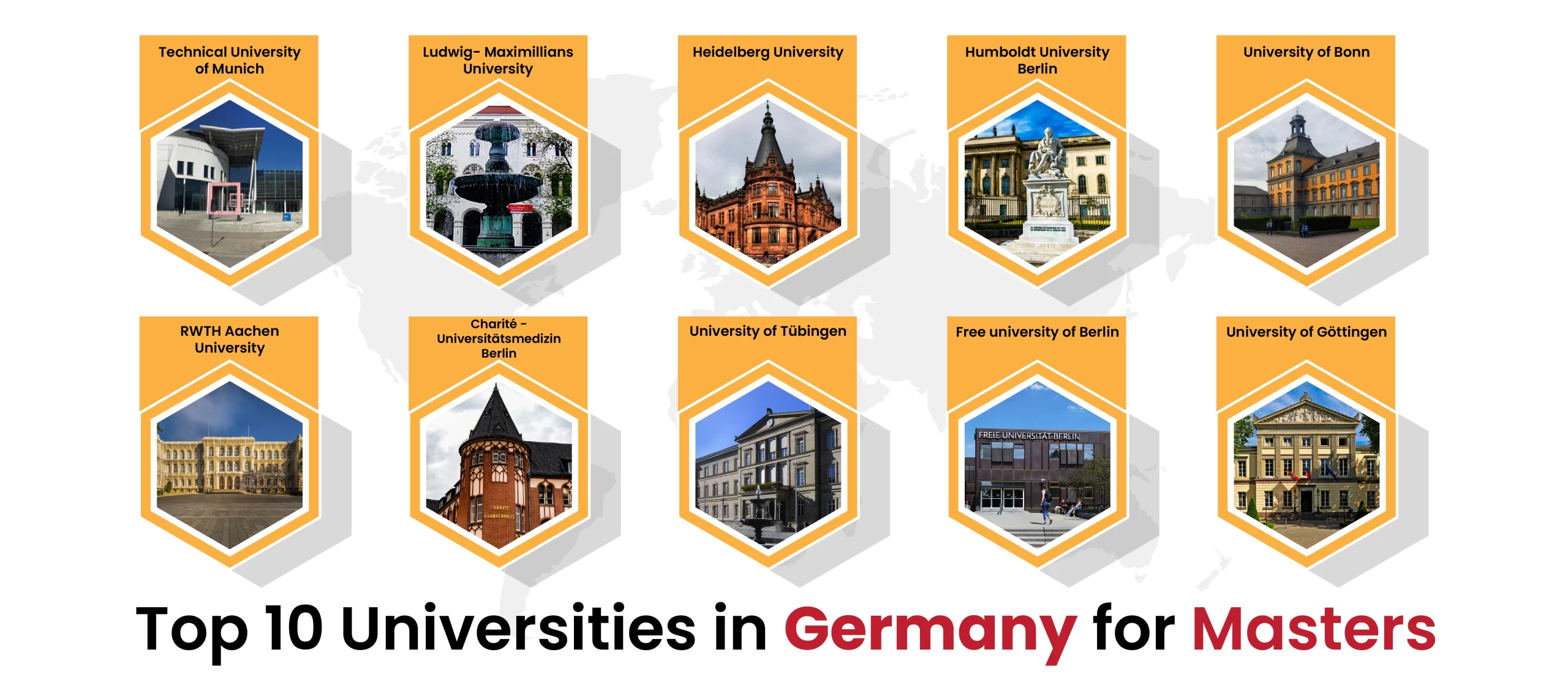Engineering has become the top choice for both Indian students and their families. Families viewed the engineering not just as a career path but as a secured future. Recent data shows that over 16 million students are pursuing engineering both in India and abroad. Among foreign countries, Germany stands out for its long-standing promotion of engineering since the World War era. With its strong investment in the engineering sector, Germany is a preferred country among Indian students who decides to study abroad. For students who want to pursue studies at German engineering colleges, this blog would come in handy. This blog highlights the top engineering universities in Germany, along with some other factors such as admission requirements and how to apply to German engineering universities and concludes with some frequently asked questions.
Table of Content
1Study Engineering in Germany2Top Engineering Universities in Germany for Indian Students3Cost of Engineering in Germany for Indian Students4Admission Requirements for Engineering Colleges in Germany5How to Apply for German Universities6Job Opportunities after Engineering in Germany7Conclusion8Frequently Asked Questions
Study Engineering in Germany
Germany is known for its technological advances in the engineering sector. One comes to Germany for engineering studies because of:
High Quality Education: According to World Population Review, the Germany education system ranks 3rd in the world. These rankings prove that German education is on par with the global standards.
Affordable Institutions: Germany is home to public universities, and the fee for higher education in those universities is mostly free. Sometimes, they charge a nominal fee to cover administrative and transportation costs. Additionally, these universities offer Germany scholarship for Indian students as well as international students to help ease their financial burden.
Universal Mode of Communication: Many engineering courses are offered in English, alongside German. The professors who teach these courses also deliver their lectures in English, ensuring that there is no sense of isolation.
Part Time Jobs: Finding part-time jobs in Germany is easy, and the pay is high. On average, the pay ranges from €9 to €15 per hour. These part-time jobs serve as internships, providing opportunities to develop essential skills for a future career.
Post Graduation: After completion, the student can get an 18-month job seeker visa to find a job in accordance with their study. This is the longest period available for individuals to find the right job.
Top Engineering Universities in Germany for Indian Students

In Germany, there are more than 250 universities that welcome international students to study the Germany courses. Each and every university has a unique way of explaining the subject to students. For Indian students aspiring to study engineering, the following are the top engineering universities in Germany:
1. Technical University of Munich
2. RWTH Aachen University
3. Karlsruhe Institute of Technology
4. Technical University of Berlin
5. Technical University of Dresden
6. Technical University of Darmstadt
7. University of Stuttgart
8. Ludwig-Maximilian University of Munich
9. Humboldt University of Berlin
10. University of Erlangen Nuremberg
Let’s look at the insights of the top engineering colleges in Germany.
Technical University of Munich
The Technical University of Munich (TUM) is the top university in Germany. Founded in 1868, TUM has 13 academic divisions and offers more than 150 degree programs. TUM ranked 19th across the globe, making it one of the top engineering colleges in the world. Moreover, Indian students prefer TUM because of its strong ties with global companies, offer excellent research opportunities, and provide a vibrant student community.
| Type of University |
|
| Location |
|
| Language of Teaching |
|
| Courses offered |
|
| Scholarships offered |
|
RWTH Aachen University
Like TUM, RWTH Aachen University (Rheinisch-Westfälische Technische Hochschule), founded in 1870, is a public research university. The university is the largest technical university in the country and one of the most prestigious in Europe. RWTH is among the top universities in Germany. The university’s high-quality education and proximity to industrial hubs make it ideal for internships and career opportunities.
| Type of University |
|
| Location |
|
| Language of Teaching |
|
| Courses offered |
|
| Scholarships offered |
|
Karlsruhe Institute of Technology
Karlsruhe Institute of Technology (KIT), one of the top engineering universities in Germany, is also a public university. Among the list of German universities that ranked as top, KIT is the only German university of excellence with a national large-scale research sector. Also, KIT has a well-established reputation in both academia and industry, providing a strong foundation for future engineers.
| Type of University |
|
| Location |
|
| Language of Teaching |
|
| Courses offered |
|
| Scholarships offered |
|
Technical University of Berlin
The Technical University of Berlin is located at the heart of Germany. As one of the public universities in Germany, it aims to develop science and technology for the benefit of society. Also, Indian students enrol at this university because of its international atmosphere, a diversified student community, and ample opportunities in tech startups.
| Type of University |
|
| Location |
|
| Language of Teaching |
|
| Courses offered |
|
| Scholarships offered |
|
Technical University of Dresden
The Technical University of Dresden is one of the largest institutes of higher education in Germany and one of the most dynamic engineering schools in Europe. As one of the top engineering universities in Germany, TUD has been one of Germany’s “Universities of Excellence” since 2012 and welcomes international students with open hands. With its cutting-edge technologies and upgrades towards a contemporary curriculum, most of the Indian students’ land at TUD to study the Germany education of engineering.
| Type of University |
|
| Location |
|
| Language of Teaching |
|
| Courses offered |
|
| Scholarships offered |
|
Technical University of Darmstadt
Founded in 1877, the Technical University of Darmstadt is a research university renowned for its emphasis on research-driven education and strong engineering programs. The university actively collaborates with leading engineering firms, offering students valuable internships and job placement opportunities, which attract many Indian students to enrol.
| Type of University |
|
| Location |
|
| Language of Teaching |
|
| Courses offered |
|
| Scholarships offered |
|
University of Stuttgart
Founded in 1829, the University of Stuttgart is one of the oldest technical universities in Germany. Among the top engineering universities in Germany, this university stands for an interdisciplinary integration of several sectors, including engineering, natural, cultural, and social sciences. Additionally, Stuttgart, located at the heart of Germany’s automotive industry, offers exceptional opportunities for both internships and career advancement. This attraction factor is the primary reason for Indian students to come to Germany.
| Type of University |
|
| Location |
|
| Language of Teaching |
|
| Courses offered |
|
| Scholarships offered |
|
Ludwig-Maximilian University of Munich
The Ludwig-Maximilian University of Munich is one of the top engineering universities in Germany that was founded in 1472. The university is renowned for its commitment to the highest international standards of research and teaching. The university attracts many Indian students due to its diverse, inclusive environment, along with strong research opportunities and collaborative partnerships.
| Type of University |
|
| Location |
|
| Language of Teaching |
|
| Courses offered |
|
| Scholarships offered |
|
Humboldt University of Berlin
Humboldt University of Berlin, founded in 1810 by Wilhelm von Humboldt, is one of Germany’s oldest and most prestigious universities, known for shaping the modern research university model. With a rich intellectual history, the university has been home to numerous Nobel laureates and prominent thinkers, including Karl Marx, Albert Einstein, and Max Weber. Humboldt University maintains a strong focus on interdisciplinary research and global collaboration, attracting students and scholars from around the world. It continues to be a leading institution in higher education and research.
| Type of University |
|
| Location |
|
| Language of Teaching |
|
| Courses offered |
|
| Scholarships offered |
|
University of Erlangen Nuremberg
The University of Erlangen-Nuremberg (FAU), founded in 1743, is one of Germany’s largest universities, known for its interdisciplinary approach and strong research focus. Located in Erlangen and Nuremberg, Bavaria, it offers programs across engineering, natural sciences, business, humanities, and social sciences. FAU is particularly renowned for its research in materials science, medical technology, and artificial intelligence and maintains strong industry ties and an international academic community.
| Type of University |
|
| Location |
|
| Language of Teaching |
|
| Courses offered |
|
| Scholarships offered |
|
Cost of Engineering in Germany for Indian Students
If an Indian student decides to undergo B.Tech in Germany, one of the unavoidable factors to consider is the cost of studying. Whether a student chooses to enroll at top engineering universities in Germany or other types of universities, the cost factor is an inevitable consideration. To provide a clear overview, the following outlines the cost factors associated with studying engineering at both public and private universities in Germany:
Public Universities:
-
- Public universities in Germany are completely free for all students, including international students.
- Only the administration fee of €265 per year is applicable.
- Master’s degrees in Germany are completely free for students who complete their bachelor’s degree there, provided they are in the same field of study.
Private Universities:
-
- Unlike public universities, private universities in Germany charge tuition fees. But the tuition fee is not uniform across universities.
- A bachelor’s degree would range from €10,000 to €15,000 per year, whereas a master’s would range from €10,000 to €20,000 per year.
Admission Requirements for Engineering Colleges in Germany
This one is a vital one for Indian students to study in Germany. Without proper documentation, one may reject the application. Hence, one must collect all the necessary documents to meet the admission requirements. The following are the key requirements for admission to engineering colleges in Germany:
- A minimum GPA of 3.0 (60-74%)
- If the concerned university does not recognize their school leaving certificate, Indian students may be required to complete a one-year preparatory course (Studienkolleg).
- The completed Preparatory Course Assessment test (Feststellungsprüfung)
- Language Proficiency:
- German: B1 level or higher.
- English: IELTS – 5-6.0; TOEFL – 80-100.
- Identity Document
- University Application Form
- Letter of Recommendation
- Personal Statement
- Completion of bachelor’s degree if apply for masters.
- A valid Germany student visa.
How to Apply for German Universities
Indian students wishing to enroll at top engineering universities in Germany must follow certain steps. Following are the steps for enrollment:
Choosing the Right Program & University: Through thorough research and careful analysis, finalize your area of study and choose the right engineering university.
Meeting the Requirements: After that, visit the official website of that particular college and check the requisites. Next, begin gathering the required documents accordingly.
Cracking the Language Tests: The most relevant document for filing the application is the scorecard of the language proficiency tests. Whether it is German or English, make sure to meet at least the minimum scores.
Filing the Application: The next step would be to file the application. Before filing, check the required documents again and start entering the details, from personal to academic. Then, attach the mentioned documents as per the required format. Before logging out, pay the application fee.
Processing the Visa: If the application turned out to be successful, the next step would be visa approval. If a student is not aware of the visa process, they can seek guidance from consultancies. One such consultancy is CanApprove, one of the leading Germany education consultants who provide tailored guidance from scratch.
After getting the visa, depart to Germany and start learning about Engineering.
Job Opportunities after Engineering in Germany
During their studies, Indian students can work part-time, gaining exposure to the work environment. These part-time jobs help develop valuable skills such as team management, communication, critical thinking, and more. While students may choose jobs related to their field of study, the following are some of the most sought-after job opportunities in Germany:
- Software Developer and Programmer
- Electronics Engineer
- IT Consultant & IT Analyst
- Mechanical Engineer
- Civil Engineer
- Electrical Engineer
Conclusion
On the whole, the practical form of science is engineering. Engineering studies are always on the table for Indian students who completed their higher secondary certification. With affordable to nil tuition fees, Germany would be the no. 1 choice for Indian students. Additionally, pursuing engineering at top engineering universities in Germany elevates students’ careers to a global standard. Hence, if you want to move to Germany for education and don’t know where to begin, consider CanApprove.





